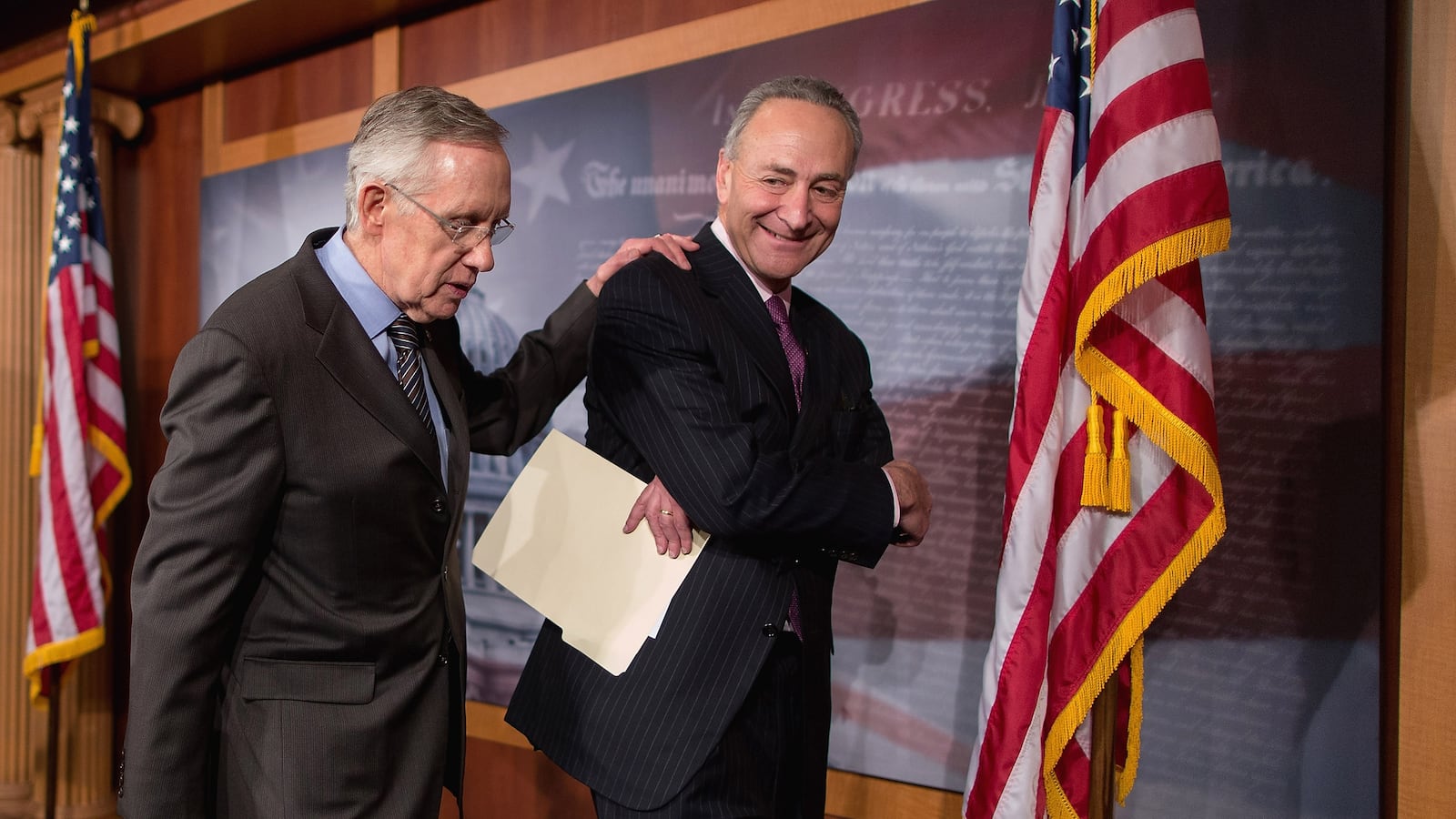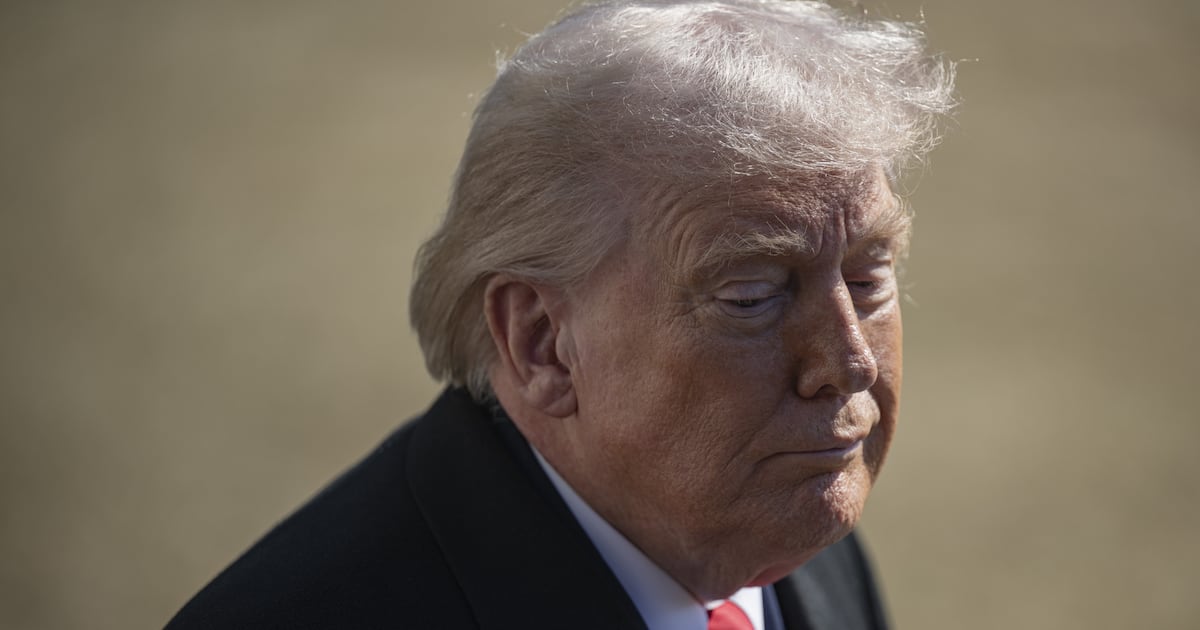It’s a “power grab,” declared an exasperated Mitch McConnell, the Senate minority leader. Sen. Rand Paul (R-KY) cried out, “We’ve got a big bully…What we really need is an anti-bullying ordinance in the Senate.” And Sen. John McCain (R-AZ) vowed that Senate Democrats “will pay a heavy, heavy price” for their conduct.
What caused these Republican senators to freak out? Did Majority Leader Harry Reid give Paul a wedgie? Did Senate Democrats change the locks on the Senate and not tell the Republicans? Nope, the outrage erupted after Senate Democrats brought a little democracy to the chamber.
The Senate voted on Thursday to revise its rules governing filibusters. Now, if a senator wants to wage a filibuster to prevent the confirmation of a presidential nominee such as a federal judge, the gabfest can be ended by a vote of 51 senators—not the 60 required previously.
The rule change clearly angered many, but here’s the thing: It didn’t go far enough. The Senate also should apply the rule to legislation being considered. Indeed, the entire concept of filibusters should be stricken from the Senate rules.
Today 60 votes are needed to end discussion of a bill, which means that as a practical matter, 60 percent of senators must support a piece of legislation to ensure its passage. Paradoxically, we have a political system where we democratically elect senators to work in undemocratic body.
And what’s worse, the threat of a filibuster is being used to thwart passage of legislation that has broad support. We saw an example of this perversion of democracy in April, when the Senate considered an expansion of background checks on firearm sales. Despite the votes of 54 senators for the legislation —and polls showing that 90 percent of Americans supported it—the bill died because supporters could not muster up the 60 votes needed to avoid a filibuster.
Sure, some argue that filibusters protect the rights of the minority party in the Senate. But here’s the thing: The minority party is the minority for a reason. Voters chose the other party. Plus, checks and balances are already in place to prevent the majority party from overreaching, including the House of Representatives, the president, and, ultimately, the voters.
So where did the filibuster come from? It wasn’t mentioned in the Schoolhouse Rock! “I’m Just a Bill” cartoon that taught many of us how Congress works. Yep, that singing little piece of legislation told us that for a bill to become law, it simply needed to pass both chambers of Congress. There was nothing about filibusters or cloture votes—and there easily could’ve been, because many words rhyme with both.
The filibuster also is not part of the U.S. Constitution. The concept of a filibuster, which comes from the Dutch word “pirate”—very telling—was created almost by happenstance in 1806, at the suggestion of Vice President Aaron Burr, the guy who killed Alexander Hamilton in a duel. Thereafter, senators could speak as long as they chose and nothing could be done to stop them, sorta like Donald Trump today.
The first filibuster took place in 1837 and then became an increasingly employed strategy to obstruct the passage of legislation. Finally, in 1917, a cloture vote, which could end the filibuster by a two-thirds vote of the Senate, was enacted. Why? Because President Woodrow Wilson, a Democrat, urged its passage to stop Republican senators from filibustering legislation Wilson deemed vital for the American war effort at the outset of World War I.
But the filibuster is inconsistent with our Founding Fathers’ vision of how the Senate should operate. The Constitution does prescribe specific instances when a super-majority vote in the Senate is required, such as to ratify a treaty or to override a presidential veto. If the constitutional drafters had intended to require more than a simple majority to pass legislation, they could’ve easily called for it.
And while we’re discussing updating congressional rules, the House of Representatives should revise its procedures and stop running its chamber like a local moose lodge. First on the list should be updating the House rule that empowered Speaker John Boehner to prevent a vote that would have ended the government shutdown two days into that fiasco. While a majority of House members would have supported such a measure, Boehner was able to extend the shutdown singlehandedly for 14 additional days, costing our economy approximately $24 billion in losses.
There’s no reason why the House or the Senate should be beholden to ancient, out-of-date rules just because others did in the past. They are no doubt contributing to the gridlock we see in Congress and account at least in part for Congress’s 9 percent approval rating. (Toronto’s crack-smoking Mayor Rob Ford even has a higher approval rating—he’s at 40 percent.)
It’s time for our Congress to update its rules of conduct to make the body more democratic. Who knows? Maybe these changes can get Congress working again. One thing is for sure: They can’t make Congress any worse.





